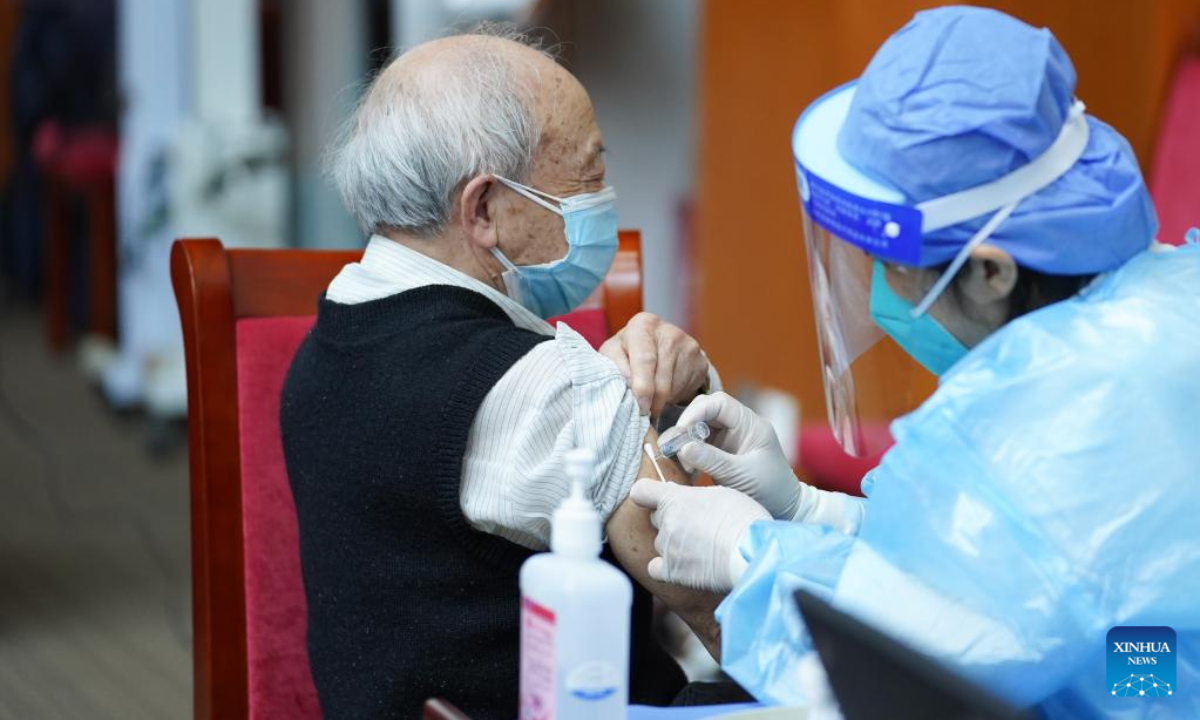
A medical worker injects COVID-19 vaccine for a senior citizen in Dongcheng District of Beijing, capital of China, April 18, 2022. Photo:Xinhua
At least a dozen cities across China further adjusted and optimized epidemic control measures over the weekend, including scrapping the requirement for frequent mass nucleic acid testing and mandatory COVID-19 test results for riding public transportation. Some cities such as Zhuhai in South China's Guangdong and Southwest China's Chongqing urged local residents not to take nucleic acid tests unless necessary, while other places explored new measures such as allowing some people who test positive for COVID to quarantine at home.
Those measures - seen as symbolic moves to ease the burden on community management and relieve the already strained public healthcare resources - should not be viewed as "lying flat" in China's COVID battle or "suddenly opening by loosening all COVID restrictions," some public health experts told the Global Times on Sunday. Following the ninth edition of China's COVID-19 control protocols and 20 optimized measures for combating the virus, China is facing a new situation as the Omicron strain shows weakened pathogenicity, which requires authorities to adjust their epidemic response in a more scientific, flexible and consistent way while gaining a window of opportunity to tackle urgent tasks such as boosting vaccination rates among seniors and improving medical preparation for handling severe cases, experts said.
World Health Organization (WHO) Director-General Tedros Adhanom Ghebreyesus said at a press conference on Friday that "we are much closer to being able to say that the emergency phase of the pandemic is over, but we're not there yet," according to media reports. He warned that gaps in surveillance, testing, sequencing and vaccination are continuing to create perfect conditions for a new variant of concern to emerge that could cause significant mortality.
"I don't take current adjustment as a 'lying flat' move nor a complete opening-up but we have optimized our epidemic control measures in line with the characteristics of the virus variant, striking a new balance between epidemic control and social and economic activities," Wang Guangfa, a respiratory expert at Peking University First Hospital who was also one of the experts from the National Health Commission who visited Wuhan in January 2020, told the Global Times on Sunday.
To contain such a highly contagious virus but with weaker virulence, the cost of epidemic control measures is much higher than that in previous measures in dealing with strains with higher virulence such as the Delta variant, which makes the current adjustment very necessary, Wang said. "But it's unlikely that we'll walk out of the pandemic in a short time during this winter as many countries are facing similar resurgences."
The WHO recently warned that the 2022-2023 flu season epidemic is off to an early start in European countries and COVID-19 is still a threat. Cases in the US are climbing again as new Omicron variants spread, US media reported during the weekend. China reported more than 30,000 cases on Saturday including 4,168 domestic infections and 27,433 asymptotic cases as the number of daily cases reaches near all-time highs.
Further optimization
Shanghai announcedon Sunday it will scrap the need for a negative nucleic acid result to ride public transportation and for some outdoor venues starting from Monday, the latest major Chinese city to further optimize epidemic control measures.
Shenzhen, which is dubbed as China's Silicon Valley, issued a statementearly on Saturday, confirming that residents will no longer need to provide a nucleic acid test certificate when entering public places such as pharmacies, parks and outdoor tourist attractions, as well as taking public transport, but will still need to scan a venue code to check in at airports or train stations, and show their green health code.
Residents in Chongqing, one of the hardest-hit cities amid the current Omicron flare-up, were urged not to take nucleic acid tests unless necessary and in cities like Zhuhai in Guangdong, local authorities stopped providing free nucleic acid testing starting Sunday. A PCR testwill cost 2.6 yuan ($0.36) per person for a combined sample and 13 yuan for individual tests.
Urumqi, capital of Northwest China's Xinjiang Uygur Autonomous Region, will step up efforts to boost the resumption of work, production and business activities, officials said on Sunday. And starting from Sunday, pedestrian malls and ski resorts in the city will resume operation.
Several districts in Beijing have announced that people who stay at home and do not need to go to public places can now opt not to take daily nucleic acid tests, an approach designed to achieve a more precise way to reduce risk and conserve resources. The capital city also announced on Friday that 48-hour valid nucleic acid tests are no longer needed on buses and subways starting Monday.

